- ON THE DECADE
- THE DECADE'S CAMPAIGN
- REPORTING ON PROGRESS
- THE DECADE'S PROGRAMMES
- FOCUS AREAS
-
- Access to sanitation
- Financing water
- Gender and water
- Human right to water
- Integrated Water Resources Management
- Transboundary waters
- Water and cities
- Water and energy
- Water and food security
- Water and sustainable development
- Water and the green economy
- Water cooperation
- Water quality
- Water scarcity
- FOCUS REGIONS
- RESOURCES FOR
- UN e-RESOURCES
The human right to water and sanitation
On 28 July 2010, through Resolution 64/292, the United Nations General Assembly explicitly recognized the human right to water and sanitation and acknowledged that clean drinking water and sanitation are essential to the realisation of all human rights. The Resolution calls upon States and international organisations to provide financial resources, help capacity-building and technology transfer to help countries, in particular developing countries, to provide safe, clean, accessible and affordable drinking water and sanitation for all.
In November 2002, the Committee on Economic, Social and Cultural Rights adopted General Comment No. 15 on the right to water. Article I.1 states that "The human right to water is indispensable for leading a life in human dignity. It is a prerequisite for the realization of other human rights". Comment No. 15 also defined the right to water as the right of everyone to sufficient, safe, acceptable and physically accessible and affordable water for personal and domestic uses.
Sources:
- Resolution A/RES/64/292. United Nations General Assembly, July 2010
- General Comment No. 15. The right to water. UN Committee on Economic, Social and Cultural Rights, November 2002
The human right to water and the MDGs
Formarly acknowledging water as a human right, and expressing the willingness to give content and effect to this right, may be a way of encouraging the international community and governments to enhance their efforts to satisfy basic human needs and to meet the Millennium Development Goals.
Source: Water as a Human Right? IUCN, UNDP, 2004
What is...?
- Sufficient. The water supply for each person must be sufficient and continuous for personal and domestic uses. These uses ordinarily include drinking, personal sanitation, washing of clothes, food preparation, personal and household hygiene. According to the World Health Organization (WHO), between 50 and 100 litres of water per person per day are needed to ensure that most basic needs are met and few health concerns arise.
- Safe. The water required for each personal or domestic use must be safe, therefore free from micro-organisms, chemical substances and radiological hazards that constitute a threat to a person's health. Measures of drinking-water safety are usually defined by national and/or local standards for drinking-water quality. The World Health Organization (WHO) Guidelines for drinking-water quality provide a basis for the development of national standards that, if properly implemented, will ensure the safety of drinking-water.
- Acceptable. Water should be of an acceptable colour, odour and taste for each personal or domestic use. [...] All water facilities and services must be culturally appropriate and sensitive to gender, lifecycle and privacy requirements.
- Physically accessible. Everyone has the right to a water and sanitation service that is physically accessible within, or in the immediate vicinity of the household, educational institution, workplace or health institution. According to WHO, the water source has to be within 1,000 metres of the home and collection time should not exceed 30 minutes.
- Affordable. Water, and water facilities and services, must be affordable for all. The United Nations Development Programme (UNDP) suggests that water costs should not exceed 3 per cent of household income.
Did you know?
- In rural Sub-Saharan Africa millions of people share their domestic water sources with animals or rely on unprotected wells that are breeding grounds for pathogens.
- The average distance that women in Africa and Asia walk to collect water is 6 kilometres.
- Average water use ranges from 200-300 litres a person a day in most countries in Europe to less than 10 litres in countries such as Mozambique. People lacking access to improved water in developing countries consume far less, partly because they have to carry it over long distances and water is heavy. For the 884 million people or so people in the world who live more than 1 kilometre from a water source, water use is often less than 5 litres a day of unsafe water.
- The basic requirement for a lactating women engaged in even moderate physical activity is 7.5 litres a day.
- At any one time, close to half of all people in developing countries are suffering from health problems caused by poor water and sanitation. Together, unclean water and poor sanitation are the world's second biggest killer of children. It has been calculated that 443 million school days are lost each year to water-related illness.
- In Tajikistan nearly a third of the population takes water from canals and irrigation ditches, with risks of exposure to polluted agricultural run-off.
- A survey of 5 000 schools in Senegal showed that over half had no water supply and almost half had no sanitation facilities. Of those schools with sanitation, only half had separate facilities for boys and girls. The result was that girls chose not to utilise these facilities, either because they did not want to risk being seen to use the toilet, or because they were warned that these facilities were not private or clean enough. Girls also avoided drinking water at school to avoid urination, thereby becoming dehydrated and unable to concentrate
- People living in the slums of Jakarta, Manila and Nairobi pay 5 to 10 times more for water than those living in high-income areas in those same cities and more than consumers in London or New York. In Manila, the cost of connecting to the utility represents about three months' income for the poorest 20% of households, rising to six months' in urban Kenya.
Sources:
- Human Development Report 2006. Beyond scarcity: Power, poverty and the global water crisis. UNDP, 2006
- (The) Right to Water, Fact Sheet No. 35. United Nations, OHCHR, UN-HABITAT, WHO, 2010
UN initiatives that are helping to raise the issue...
- Human Rights Council Resolution A/HRC/RES/18/1
On 28 September 2011, the UN Human Rights Council passed a new resolution which takes the human right to safe drinking water and sanitation a step further. The Council welcomed the submission of the compilation of good practices on the right to safe drinking water and sanitation, in which the Special Rapporteur put particular emphasis on practical solutions with regard to the implementation of the human right to safe drinking water and sanitation. The resolution calls on States to ensure enough financing for sustainable delivery of water and sanitation services. - World Health Assembly Resolution 64/24 [
 - 24 KB]
- 24 KB]
In May 2011, the World Health Organization (WHO), through Resolution 64/24, made a call to Member States "to ensure that national health strategies contribute to the realization of water- and sanitation-related Millennium Development Goals while coming in support to the progressive realization of the human right to water and sanitation" and to WHO's Director General to "to strengthen WHO's collaboration with all relevant UN-Water members and partners, as well as other relevant organizations promoting access to safe drinking-water, sanitation and hygiene services, so as to set an example of effective intersectoral action in the context of WHO's involvement in the United Nations Delivering as One initiative, and WHO's cooperation with the United Nations Special Rapporteur on the human right to safe drinking water and sanitation with a view to improving the realization of the human right to water and Sanitation". - Appointment of an independent expert [
 - 32 KB]
- 32 KB]
In March 2008, through resolution 7/22, the Human Rights Council decided "To appoint, for a period of three years, an independent expert on the issue of human rights obligations related to access to safe drinking water and sanitation". In April 2011, through resolution 16/2, the Human Rights Council decided to extend the mandate for a period of three years. The Independent Expert monitors and reports on States' implementation of the right to water as well as related violations.
To know more
 The Equitable Access Score-card: Supporting policy processes to achieve the human right to water and sanitation
The Equitable Access Score-card: Supporting policy processes to achieve the human right to water and sanitation
Economic Commission for Europe (UNECE). November 2013
This publication provides an analytical tool designed to help Governments and other stakeholders to establish a baseline measure of the equity of access to water and sanitation, identify related priorities, discuss further actions to be taken and evaluate progress through a process of self-assessment. The publication contains recommendations on how to plan for the self-assessment and provides concrete examples of the benefits of using the score-card in different settings. Parties to the Protocol on Water and Health and other stakeholders can use the Equitable Access Score-card to support the definition of targets to bridge the existing gaps in access to water and sanitation and thus to achieve the human right to water and sanitation.
 Report of the Special Rapporteur on the human right to safe drinking water and sanitation, Catarina de Albuquerque. Sustainability and non-retrogression in the realisation of the rights to water and sanitation
Report of the Special Rapporteur on the human right to safe drinking water and sanitation, Catarina de Albuquerque. Sustainability and non-retrogression in the realisation of the rights to water and sanitation
UN Special Rapporteur on the human right to safe drinking water and sanitation. July 2013
Focusing on sustainability in the realization the human rights to water and sanitation, the Special Rapporteur examines in this report how the rights to water and sanitation can and must be met for present and future generations. She highlights challenges to sustainability and particularly aggravated risks in times of economic and financial crisis. After addressing the relevance of sustainability to the core human rights concepts of “progressive realization” and “non-retrogression”, the Special Rapporteur explains how the normative content and principles of the human rights to water and sanitation contribute to ensuring sustainability. Using the human rights framework, the Special Rapporteur analyses States’ common approaches to water and sanitation, particularly in adopting measures both during times of normalcy and during economic and financial crises, and shows how those approaches often fail to incorporate sustainability. She then demonstrates that the human rights framework can and should facilitate improvement in such policies.
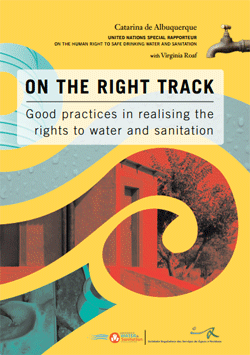 On the right track. Good practices in realising the rights to water and sanitation
On the right track. Good practices in realising the rights to water and sanitation
UN Special Rapporteur on the human right to safe drinking water and sanitation. February 2012
This compendium of good practices on the human right to water and sanitation provides discussion and analysis of existing practices, with the aim of inspiring policy and decision-makers, practitioners, activists and civil society in general to engage with the rights to water and sanitation and to assist in the difficult but crucial process of ensuring that everyone has access to safe drinking water and sanitation services for all daily personal and domestic purposes. Practices have been organised into four main types, and the chapters are named accordingly.
 Reader on the Human Right to Water and Sanitation
Reader on the Human Right to Water and Sanitation
[ - 175 KB]
- 175 KB]
UN-Water Decade Programme on Advocacy and Communication (UNW-DPAC). 2011
This reader is intended for all those interested in getting familiar with issues related to the human right to water. The reader provides basic references for easy reading and some of the latest and most relevant United Nations publications on this issue. Link is provided when the publication is available online.
 (The) Right to Water. Fact sheet No. 35
[
(The) Right to Water. Fact sheet No. 35
[ - 333 KB]
- 333 KB]
United Nations, Office of the High Commissioner for Human Rights (OHCHR), United Nations Human Settlements Programme (UN-Habitat), World Health Organization (WHO). 2010
This publication explains what the right to water is, illustrates what it means for specific individuals and groups, and then elaborates upon State obligations with respect to the right. It concludes with an overview of national, regional and international accountability and monitoring mechanisms.
 Outcome of the International Experts' Meeting on the Right to Water. Paris, 7 and 8 July 2009
[
Outcome of the International Experts' Meeting on the Right to Water. Paris, 7 and 8 July 2009
[ - 566 KB]
- 566 KB]
United Nations Educational, Scientific and Cultural Organization (UNESCO), UNESCO Etxea - UNESCO Centre Basque Country. 2009
This publication analyzes the human right to water, its content, evolution, legal basis and implementation; summarizes UNESCO's position on the issue; examines some innovative policies that seek to realize the right to water, including examples from Brazil, South Africa, Belgium and the Philippines; and makes a number of suggestions to assist decision-makers in their efforts to implement the right to water and access to adequate sanitation.
 Sanitation: A human rights imperative
Sanitation: A human rights imperative
United Nations Human Settlements Programme (UN-Habitat), Swiss Agency for Development and Cooperation (SDC), Centre on Housing Rights and Evictions (COHRE), WaterAid. 2008
This publication analyzes the human right to water, its content, evolution, legal basis and implementation; summarizes UNESCO's position on the issue; examines some innovative policies that seek to realize the right to water, including examples from Brazil, South Africa, Belgium and the Philippines; and makes a number of suggestions to assist decision-makers in their efforts to implement the right to water and access to adequate sanitation.
 Manual on the Right to Water and Sanitation
Manual on the Right to Water and Sanitation
United Nations Human Settlements Programme (UN-HABITAT), Centre on Housing rights and Evictions (COHRE), American Association for the Advancement of Science (AAAS), Swiss Agency for Development and Cooperation (SDC). 2007
This manual is designed to assist policy makers and practitioners in implementing the right to water and sanitation. This publication, written in non-legal language, addresses the vital need to clarify how human rights can be practically realised in the water and sanitation sector. The Manual recognizes that implementing the right to water and sanitation is not limited to legal recognition or allocation of funds. Rather, it provides the basis for practical reforms in many areas of water supply and sanitation and in water resource management that can help make the water and sanitation sector operate in a manner that is more pro-poor, accountable and inclusive.
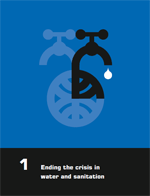 Human Development Report 2006. Beyond scarcity: Power, poverty and the global water crisis. Chapter 1
Human Development Report 2006. Beyond scarcity: Power, poverty and the global water crisis. Chapter 1
[ - 1.26 MB]
- 1.26 MB]
United Nations Development Programme (UNDP). 2006
Chapter 1 of the Human Development Report 2006 'Ending the crisis in water and sanitation' focuses on the world's water and sanitation crisis, the human development costs of the crisis and the role recognizing the human right to water and sanitation can play in making progress a reality.
 Water as a Human Right?
[
Water as a Human Right?
[ - 388 KB]
- 388 KB]
International Union for Conservation of Nature and Natural Resources (IUCN), United Nations Development Programme (UNDP). 2004
Why do we need a right to water? What would be the benefits and contents of such a right? What mechanisms would be required for its effective implementation? Should the duty to provide basic water sanitation for all be placed on governments alone, or should the responsibility in this regard be borne also by private actors, both individual and corporate, national as well as international? These paper addresses these critical questions in detail and provides the material and analysis necessary to tackle them.
 (The) Human Right to Water. Legal and Policy Dimensions
[
(The) Human Right to Water. Legal and Policy Dimensions
[ - 694KB]
- 694KB]
International Bank for Reconstruction and Development (IBRD), World Bank. 2004
This Study analyzes the resolutions and declarations of the various conferences and forums that have been held since the early 1970s, and the ways in which they have confronted the issue of the right to water. The Study then discusses the evolution of the international legal regime for the protection and promotion of human rights, and pays particular attention to the Universal Declaration of Human Rights and the International Covenant on Economic, Social and Cultural Rights, as well as to the International Covenant on Civil and Political Rights. The role of each of the committees established to oversee the implementation of the two Covenants is considered. The last two parts of the Study are devoted to General Comment No. 15, which recognizes the human right to water. These parts analyze the extent to which the Comment recognizes a legal right to water, and highlights some policy aspects that are related to, and may affect, this right.
 (The) Right to Water
[
(The) Right to Water
[ - 593.4 KB]
- 593.4 KB]
World Health Organization (WHO), Office of the High Commissioner for Human Rights (OHCHR), Centre on Housing Rights and Evictions (COHRE), Water Aid, Centre on Economic, Social and Cultural Rights. 2003
This publication outlines the scope and content of the legal definition of the human right to water and its relationship to other civil, cultural, economic, political, and social rights; discusses the right to water as a human right, and examines its implications on the roles and responsibilities of various stakeholders; examines the various communities affecting and being affected by the right to water; considers the contribution the right to water can and should make towards making drinking-water a reality for all; and explores a human rights-based approach to water.
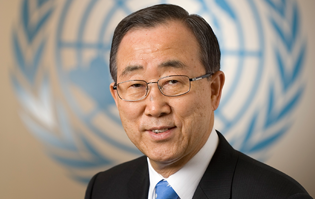
"The children who have no clean water to drink, the women who fear for their safety, the young people who have no chance to receive a decent education have a right to better, and we have a responsibility to do better. All people have the right to safe drinking water, sanitation, shelter and basic services."
Ban Ki-moon, UN Secretary General
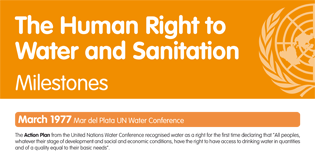
This document presents the UN historical background and evolution of recognition of the human right to water and sanitation.
>> UN Milestones
[ - 112 KB]
- 112 KB]

This document presents the current situation and some examples illustrating how the human right to water and sanitation is being implemented in practice.
>> Media brief
[ - 187 KB]
- 187 KB]
>> Short glossary on the human right to water and sanitation
[ - 28 KB]
- 28 KB]
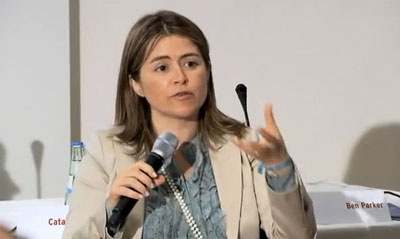
>> Water for Life. Water and Sanitation as a Human Right
Duration: 19min09sec
Video on the UN-Water Interview Session at Deutsche Welle Global Media Forum (Bonn, Germany), 20 June 2011. This session was organized by the United Nations Office to Support the International Decade for Action "Water for Life" 2005-2015/UN-Water Decade Program on Advocacy and Communication (UNW-DPAC), in collaboration with UN-Habitat, the UN-Water Decade Program on Capacity Building (UNW-DPC) and the Water Supply and Sanitation Collaborative Council (WSSCC). During the session, the panel and the audience discussed about the UN resolution, the aspect of sanitation, the country example of South Africa and experiences and opinions from the audience.
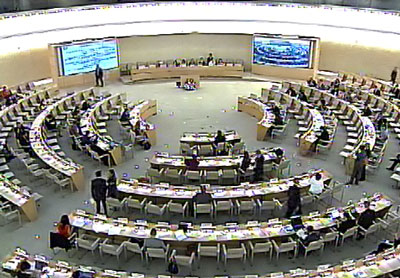
>> Interactive Dialogue on the Right to Water and Sanitation
Duration: 2h45min47sec
Interactive Dialogue with the Independent Expert on the issue of human rights obligations related to safe drinking water and sanitation at the 8th Plenary Meeting of the 18th Session of the United Nations Human Rights Council, 15 September 2011.

>> Rector Szöllösi-Nagy talks about UN's legal recognition of water and sanitation as a human right
UNESCO-IHE
Duration: 4min08sec
Rector of UNESCO-IHE Institute for Water Education talks about the breakthrough of UN's legal recognition of water and sanitation as a human right, and the process it took to get there.
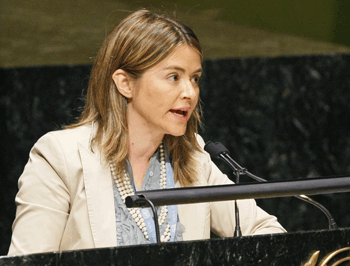
Catarina de Albuquerque United Nations Special Rapporteur of the Human Rights Council on the Human Right to Safe Drinking Water and Sanitation
As Special Rapporteur, Ms. de Albuquerque monitors the right to water and sanitation worldwide, offering advice to Governments, UN agencies and civil society, among other stakeholders. She prepares thematic research on issues of concern to her mandate and she undertakes country missions. She reports annually to the UN Human Rights Council on the work she has accomplished under her mandate. She has been working on this mandate since November 2008.
To request an interview, please send an email to Pilar González
Copyright | Terms of use | Privacy notice | Site Index | Fraud alert | Help





